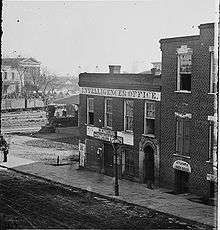Daily Intelligencer (Atlanta)
The Intelligencer was a weekly, and later daily newspaper first published in Atlanta on June 1, 1849 as The Weekly Intelligencer.[1] The founders were Benjamin Bomar, Zachariah A. Rice, Jonathan Norcross and Ira O. McDaniel.[2][3] During the American Civil War, the newspaper had great trouble acquiring paper from its supplier, the paper mill at Sope Creek.
 Office of the Intelligencer shortly after the surrender of Atlanta | |
| Founder(s) | Benjamin Bomar, Zachariah A. Rice, Jonathan Norcross and Ira O. McDaniel |
|---|---|
| Founded | June 1, 1849 |
| Ceased publication | April 24, 1871 |
| OCLC number | 20942138 |
In 1864, it was purchased by Jared Whitaker, who briefly moved it to Macon during the war.[4][5] He moved it back to Atlanta after the war, and it was the only city paper to survive.[2] John H. Steele served as its editor from 1860 until his death in January 1871. Captain Evan Howell was its city editor starting in 1868.
The paper closed in April 1871, soon after Steele's death and after intense competition from the new Atlanta Constitution.[6][7] The newer paper bought at auction the mechanical equipment of the Intelligencer. At that same auction, Whitaker purchased the archives and other paperwork.
Notes
- "The Weekly intelligencer. (Atlanta, Ga.) 186?-1865 « Georgia Historic Newspapers". gahistoricnewspapers.galileo.usg.edu. Digital Library of Georgia. Retrieved 9 February 2020.
The Intelligencer began weekly publication in June of 1849 using the Miscellany's old printing equipment, and covered not just local and national news, but also international events utilizing a telegraph station that ran through its building. In 1854, the paper began daily publication.
- Garrett, Franklin M. (2011). Atlanta and Environs: A Chronicle of Its People and Events, 1820s-1870s. University of Georgia Press. ISBN 978-0-8203-3903-0. Retrieved 9 February 2020.
- Davis, Stephen; Richards, William A. (Spring 1992). "An Atlantan Goes to War: The Civil War Letters of Maj. Zachariah A. Rice, C.S.A." Atlanta History: A Journal of Georgia and the South. 36 (1): 20–39. Archived from the original on 9 February 2020. Retrieved 9 February 2020.
Rice was also briefly involved in newspaper publishing. In 1849, he, Jonathan Norcross, Ira O. McDaniel, and Benjamin F. Bomar purchased the Southern Miscellany, which they renamed the Weekly Atlanta Intelligencer.
- Venet, Wendy Hamand (2017). A Changing Wind: Commerce and Conflict in Civil War Atlanta. University of Georgia Press. pp. 26–27. ISBN 978-0-8203-5136-0. Retrieved 9 February 2020.
- Risley, Ford (2004). The Civil War: Primary Documents on Events from 1860 to 1865. Greenwood Publishing Group. p. 246. ISBN 978-0-313-32126-9. Retrieved 9 February 2020.
- Malone, Henry T. (1953). "The Weekly Atlanta Intelligencer As a Seccessionist Journal". The Georgia Historical Quarterly. 37 (4): 278–286. ISSN 0016-8297. JSTOR 40577465.
- "Daily Atlanta intelligencer. (Atlanta, Ga.) 1868-1871 « Georgia Historic Newspapers". gahistoricnewspapers.galileo.usg.edu. Digital Library of Georgia. Retrieved 9 February 2020.
In November of 1864, the forces of Union General William T. Sherman and his Union troops captured Atlanta and burned down substantial portions of the city. The destruction dealt a blow to the city's newspaper industry as the Intelligencer was the only Atlanta paper to survive the war. The success of the Atlanta Constitution in the post-war years, however, forced the Atlanta Intelligencer out of business in 1871.
External links
- "The daily intelligencer. (Atlanta, Ga.) 1858-1868 « Georgia Historic Newspapers". gahistoricnewspapers.galileo.usg.edu. Digital Library of Georgia.
